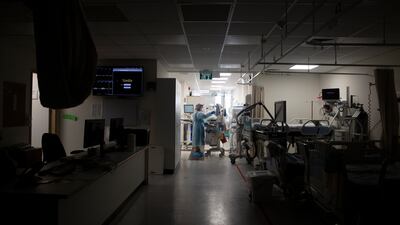Follow the latest updates on the Covid-19 pandemic here
Israel registered a record number of daily coronavirus cases last week, but authorities remain determined to allow holiday celebrations to go ahead in the coming weeks.
The festive season starts on Monday evening with celebrations to mark Jewish New Year - known as Rosh Hashanah - followed by other holidays throughout September and culminating with Simchat Torah on September 28.
In the coronavirus intensive care unit at Rambam Health Care Campus in Haifa, northern Israel, a 19-year-old man lies on his chest surrounded by monitors.
He is one of 679 seriously ill Covid-19 patients in Israel.
“We do see young patients with very severe disease who are unvaccinated,” said Ami Neuberger, director of one of the hospital’s four coronavirus wards.
director of a coronavirus ward at Rambam Health Care Campus
A 21-year-old woman, her sister and parents were also admitted to the hospital recently. Her voice hoarse after being discharged from intensive care, the woman said they would all be vaccinated in the future.
“We are much better off than the third wave, but it’s still a huge disappointment that we are here. We thought the vaccination was the end of it,” Dr Neuberger said.
Israel registered 11,187 coronavirus cases on Thursday, the highest daily tally since the pandemic began.
More than 8 per cent of tests returned positive results that day, a rate not reported since early February.
Israel carried out one of the world’s fastest vaccination drives in December, but an estimated one million eligible people have not yet been inoculated.
The Palestinian territories are far behind, with fewer than 467,000 Palestinians fully inoculated out of a population of five million across Gaza and the occupied West Bank.
Israel has provided vaccine doses for Palestinians living in the West Bank with Israeli work permits.
Beyond the risk of infection faced by those who have not been inoculated, health specialists said the protection offered by shots waned after five or six months.
The discovery prompted the Israeli government to start administering booster shots.
More than 2.5 million people have taken a third vaccine dose so far, the Health Ministry said, out of a population of nine million.
Nihaya Daoud, a public health professor at Ben-Gurion University of the Negev in Beersheba, said cases would continue to increase for now.
“I think we will see the effect of the third vaccine maybe in a few weeks. It’s not an immediate effect,” she said.
From next month, those who were vaccinated more than six months ago must take the booster shot to hold on to a “green pass” to enter many public places.
Residents need the pass, which is also available to people who have recently recovered from coronavirus or received a negative test result, to enter businesses such as restaurants and gyms.
Other measures aimed at lowering the infection rate include mandatory mask-wearing indoors and restrictions on gatherings.
But the government has stopped short of imposing a fourth nationwide lockdown before the Jewish holidays start this week.
Over a period of more than three weeks, Israelis are expected to travel around the country and hold large family gatherings.
“We have a very challenging month ahead of us,” Israel’s coronavirus chief, Dr Salman Zarka, told Israeli news outlet Ynet on Thursday.
“Every gathering holds the potential for more infections.”
He called on unvaccinated Israelis to undergo a Covid-19 test before getting together with relatives.
He expected the coming holidays and the opening of schools last week to cause an increase in cases, but said a lockdown “will not solve our problems”.
The government is keen to avoid the shutdown imposed during the festive season last September, when more than 15 per cent of coronavirus tests returned positive results some days.
Instead, prime minister Naftali Bennett has urged the public to get vaccinated and follow the latest rules.
But compliance is proving a challenge in a country where less than three months ago the government briefly scrapped indoor mask-wearing, boasting of its success in tackling the pandemic.
“I think this was a mistake, because people felt that they are free now to do whatever they like,” Prof Daoud said.
Israelis appear divided over whether unvaccinated people should face more restrictions.
According to a survey published on Wednesday by the Israel Democracy Institute, 49 per cent of participants believe restrictions on unvaccinated people are too light, while 28.7 per cent said they were appropriate and 14.7 per cent said they were too strict.
Dr Neuberger did not know what the winter months would bring.
“We still do not know when it will end,” he said. “We are going into the realms of guessing.”


